Hunter McGrady is known as Sports Illustrated Swimsuit’s “curviest model ever.” But this milestone and other achievements weren’t enough to keep haters away. Now, she speaks about how she deals with them.
Meet Hunter McGrady.
Hunter McGrady is an American model and body positivity advocate renowned for her work in the fashion industry. Her breakthrough moment came in 2017. She was selected through an open casting call to appear in the Sports Illustrated Swimsuit Issue, making her debut as one of the magazine’s curviest models ever. This achievement marked a significant step in her career and highlighted her commitment to challenging conventional beauty standards.
McGrady’s influence extends beyond modeling. She is a vocal advocate for mental health, self-love, and body diversity. Through interviews, social media, and public appearances, she encourages people to embrace their bodies and reject unrealistic societal expectations.
The pivotal moment of her life.

McGrady’s career began as a model at the age of 15, during which she faced significant pressure to maintain a size two, leading to personal struggles with body image and self-acceptance. In a recent interview, she remembered that once she grasped the fact that being a slim fit wasn’t going to be her journey, she let herself live and be happy. Over time, she transitioned to plus-size modeling, finding her niche and voice in promoting body positivity and inclusivity within the fashion world.
It wasn’t an easy journey.

The Los Angeles native admitted that the road to acceptance was long, but therapy played a crucial role in her journey to self-love. She emphasized the importance of appreciating what our bodies can do rather than focusing on societal pressures to look a certain way.
“I think what Sports Illustrated is doing — celebrating all bodies — is so powerful. They’re doing the work. Especially right now when we’re entering this weird era, celebrating thinness,” McGrady noted.
But she keeps receiving negative comments about her body.
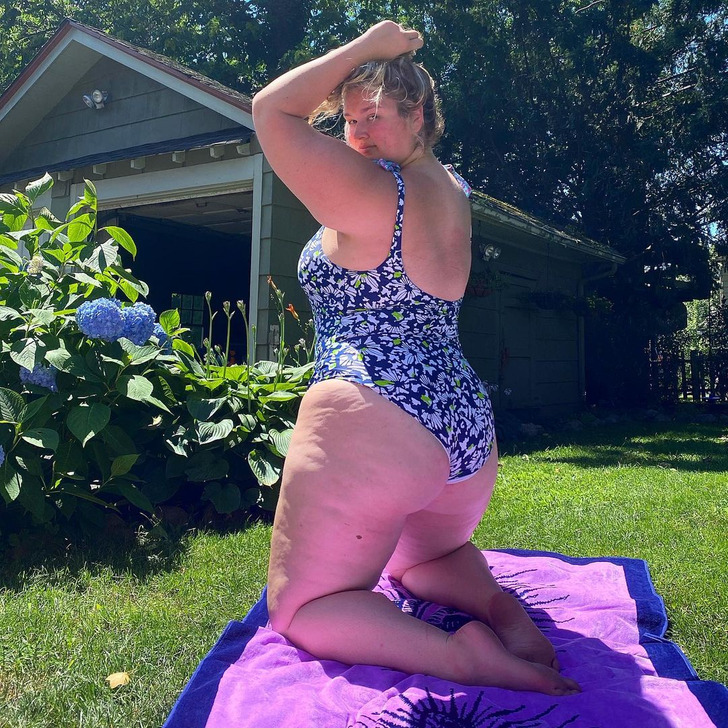
“No matter what you do, you’re going to get hate,” McGrady shrugged. “But you’re also going to get love. Negative comments or anybody who shames someone about their body? That’s so boring. Get something better to talk about.”
She emphasizes that criticism and negativity are inevitable, but so is support and appreciation. For McGrady, the act of body-shaming is tiresome and unproductive, reflecting more on the critic than the person being targeted. She encourages people to find more meaningful and positive topics of discussion, shifting focus away from superficial judgments.
Her message to plus-sized women.

McGrady stresses that self-love is the foundation of true confidence and resilience. Despite setbacks and challenges, the continuous effort to nurture self-love is crucial. Without it, external achievements and changes hold little significance.
“Confidence is not linear. It’s a climb,” she mentioned.
As the 60th-anniversary issue of Sports Illustrated Swimsuit hits newsstands, McGrady’s cover serves as a powerful reminder that beauty comes in all shapes and sizes. Through her journey and advocacy, she continues to inspire and promote a more inclusive and accepting view of beauty in the fashion industry and beyond.
O senhorio da minha filha armou uma cilada para que ela pudesse ser despejada e aumentar o aluguel – nós lhe ensinamos uma lição inteligente

Quando o telefone de Jason toca no meio da noite, ele encontra sua filha chorando. Durante a conversa, ele descobre que o senhorio dela está forçando-a a sair de seu lugar. Jason decide dar uma lição ao senhorio…
Recebi a ligação tarde da noite; foi tão inesperado que atendi sem nem pensar em quem poderia estar do outro lado. Grogue, cliquei no ícone verde e segurei meu telefone no ouvido.

Um homem dormindo | Fonte: Midjourney
“Papai”, Lily, minha filha, soluçou em meu ouvido.
“O que há de errado?”, perguntei, sentando-me imediatamente e colocando meus pés em meus chinelos. “Diga-me, Lily, o que está acontecendo?”

Uma jovem chateada | Fonte: Midjourney
“Meu senhorio descobriu que eu ganhei um aumento no trabalho. Eu estava sentado na varanda com Nolan, e nós estávamos rindo sobre isso e brindando. E, claro, ele ouviu da casa da frente. Desde então, ele continua falando sobre reformas e aluguel mais alto.”
“Ok”, eu disse lentamente, tentando entender apesar da tontura causada pelo sono.
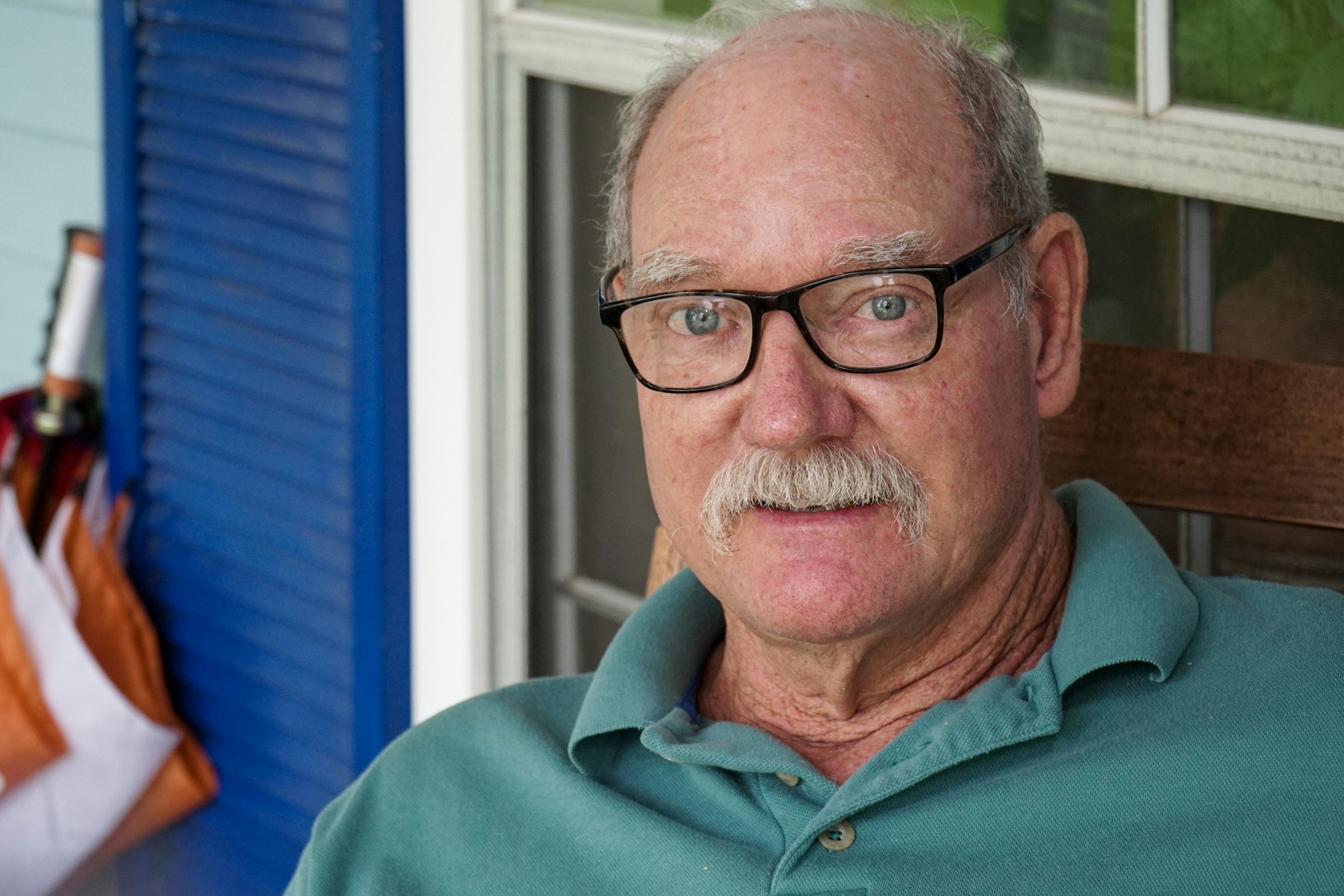
Um close-up de um homem mais velho | Fonte: Midjourney
Claro, era uma maneira nojenta de ganhar dinheiro às custas das pessoas, mas não era algo para chorar.
“Mas querida, por que você está chorando?”, perguntei, tentando manter minha voz firme.
Tudo em mim queria correr para minha filha. Mas eu não faria nada até que ela me desse uma razão para isso.

Uma jovem chateada | Fonte: Midjourney
“Depois que não tive nenhuma reação ao aumento do aluguel, ele secretamente jogou alguns recipientes químicos velhos e proibidos no meu quintal e então me acusou de violar o contrato de locação ao armazenar materiais perigosos na propriedade”, disse ela.
“O quê?”, explodi. “Isso é ilegal!”

Numerosos recipientes de plástico | Fonte: Unsplash
“E ele me deu dois dias para me mudar”, ela continuou.
Eu estava furioso. Minha filha tinha transformado aquele quintal de um terreno árido em um oásis florido. Ela colocou seu coração em cada planta, cada flor e cada vegetal.

Um lindo espaço ao ar livre | Fonte: Unsplash
Ela sempre foi assim. Lily não era o tipo de criança que ficava sentada dentro de casa brincando com seus brinquedos. Ela preferia ficar do lado de fora e sujar as mãos, tentando descobrir como as coisas cresciam.
“Isso é muito divertido, pai”, ela me disse um dia, quando eu estava cortando a grama e a pequena Lily estava plantando flores.

Uma menina em um jardim | Fonte: Unsplash
“Tem algumas minhocas ali”, ela disse, apontando. “Mas eu ainda plantei as mudas de qualquer forma.”
A mãe dela odiava isso. Ela queria que Lily tivesse roupas recém-passadas, unhas limpas e cabelos que ficassem no lugar.
“Você precisa parar de permitir esse comportamento, Jason”, minha esposa, Jenna, dizia. “Incentive-a a ser uma mocinha.”

Uma menina feliz em pé em cima de uma cama | Fonte: Midjourney
“Nem pensar, Jenna”, eu sempre dizia. “Deixe essa doce garota ser ela mesma.”
Agora, depois de tudo que Lily fez para tornar seu jardim seu próprio espaço, tudo que eu queria fazer era tentar poupar seu trabalho duro.

Uma menina subindo em uma árvore | Fonte: Pexels
“Não se preocupe, querida”, eu disse, com um plano já se formando em minha mente.
“Como, pai?” ela perguntou.
“Porque nós resolveremos isso. E faremos isso juntos.”

Um homem mais velho sorridente | Fonte: Midjourney
Na noite seguinte, apareci na casa de Lily com minha caminhonete e alguns amigos. Estávamos armados com lanternas e uma dose saudável de raiva justificada.
“Certo, rapazes”, eu disse. “Vamos fazer isso pela minha filha. Vamos dar uma lição ao Jack. Que, como senhorio, você não pode sair por aí tirando vantagem de mulheres jovens.”
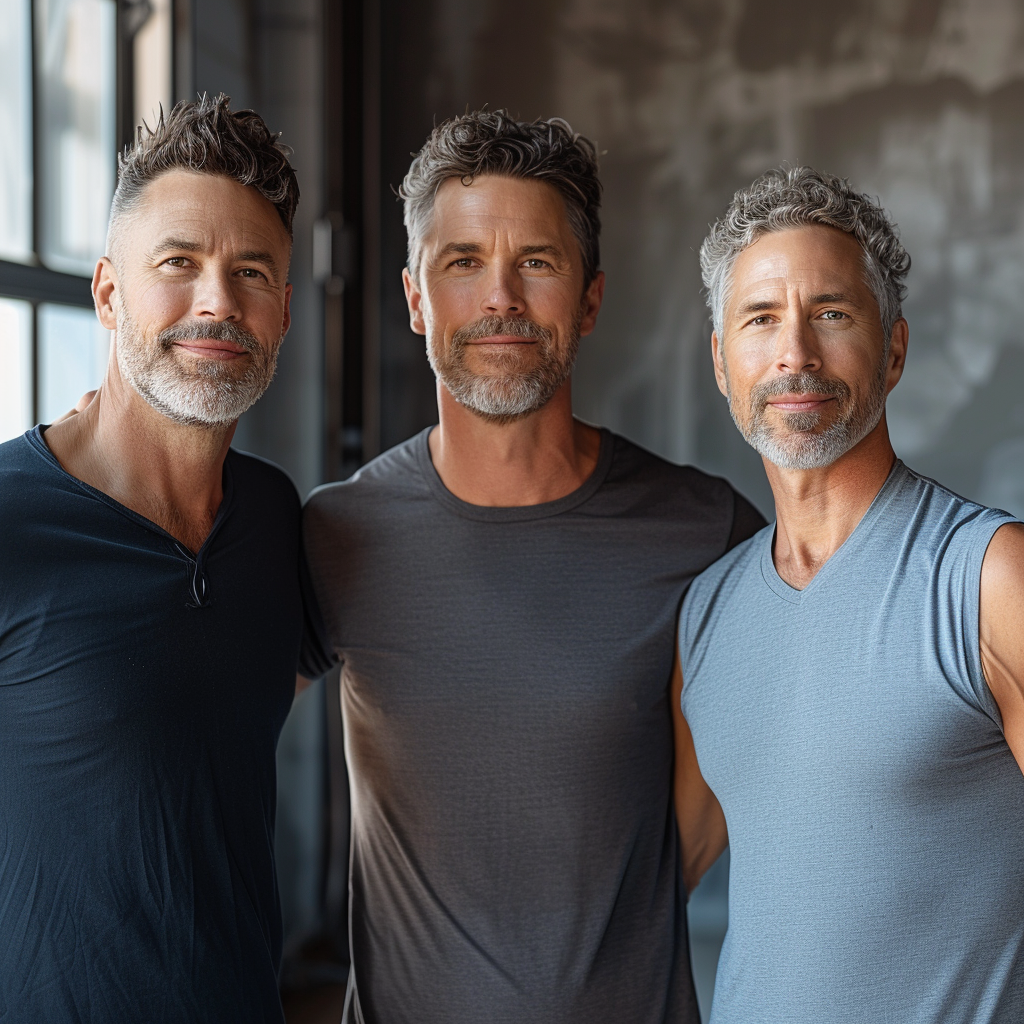
Um grupo de homens mais velhos | Fonte: Midjourney
Nós meticulosamente desmontamos todo o refúgio no quintal que Lily montou.
“Pai?” Lily perguntou quando percebeu que estávamos lá. “O que está acontecendo?”
“Oi, querida”, eu disse. “Vamos dar uma lição ao seu senhorio. Ele não pode fazer isso. Então, vamos desmontar tudo. Vou levar suas plantas para casa também.”

Ferramentas em um banco | Fonte: Midjourney
Lily bocejou e se espreguiçou.
“Vou deixar você com isso, pai”, ela disse. “Vou descansar um pouco e depois voltar a arrumar o lugar quando o sol nascer. Vou ficar com Nolan até encontrar um lugar. Ele vai chegar aqui com mais caixas em breve.”
“Continue”, eu disse. “Nós ficaremos quietos, eu prometo.”

Uma jovem cansada | Fonte: Midjourney
Enquanto trabalhávamos, cada planta carinhosamente cuidada, cada canteiro meticulosamente construído, desaparecia. Quando terminamos, o jardim outrora florescente estava reduzido a um pedaço de terra desolado, um contraste gritante com as fotos exuberantes que Jack, o proprietário, já havia postado para o novo anúncio.

Uma foto de listagem de casa | Fonte: Midjourney
“Obrigado, rapazes”, eu disse. “Vocês podem ir embora. Eu só ajudo Lily a fazer as malas. Vou pegar minha caminhonete mais tarde, Malcolm.”
Eu não tinha terminado. Ainda havia mais trabalho a ser feito.
Dentro da casa, reorganizamos os móveis para destacar todos os defeitos.

Uma mulher cercada por caixas | Fonte: Midjourney
As rachaduras nas paredes não foram escondidas pelas obras de arte de Lily. Os azulejos faltantes foram deixados expostos, sem nenhum utensílio de cozinha para cobri-los.
“Não há nada que possa ser feito sobre o mofo do teto do banheiro”, Lily me disse. “Mas eu tenho dito ao senhorio que precisávamos resolver isso.”

Rachaduras em uma parede | Fonte: Midjourney
Substituímos todas as lâmpadas por outras branco-azuladas muito brilhantes, fazendo com que todo o lugar parecesse sombrio e pouco convidativo.
Enquanto trabalhávamos, Lily e eu conversamos sobre o tempo que ela passou na casa.

Um homem carregando uma caixa | Fonte: Midjourney
“Lembro-me de quando me mudei pela primeira vez”, disse ela, com um toque de nostalgia na voz. “O quintal era só terra e concreto. E eu não achava que alguma coisa pudesse crescer aqui. Mas eventualmente cresceu. E toda vez que sentia saudades de casa, eu vinha aqui e plantava algo novo ou cuidava do que quer que estivesse crescendo.”
“E você fez isso acontecer”, respondi sorrindo. “Você transformou isso em um paraíso.”

Uma jovem plantando | Fonte: Midjourney
Ela suspirou.
“Parece tão injusto. Eu fiz tudo certo, e ele ainda encontrou uma maneira de estragar tudo.”
“Não vamos deixá-lo vencer”, assegurei a ela. “Isso é só um revés. Você tem uma nova aventura esperando por você. O lugar do Nolan é uma boa parada por enquanto, mas sei que ele está falando sério sobre você. Talvez uma nova casa juntos seja o próximo passo.”

Um pai e uma filha sorridentes | Fonte: Midjourney
Saí da casa da minha filha confiante de que o senhorio dela me acordaria muito bem no dia seguinte.
“Pai, você pode vir aqui?”, Lily me pediu no telefone naquela manhã. “Por favor, esteja aqui quando eu tiver que entregar as chaves para Jack.”
“Chego aí em breve”, eu disse, passando manteiga na minha fatia de torrada.

Torrada com manteiga em um prato | Fonte: Midjourney
Lily estava me pedindo para guardar os sapatos dela em uma caixa quando Jack entrou furioso.
“Que diabos, Lily?” ele exigiu. “Onde estão as plantas? As flores? As fotos online mostram claramente como esse lugar deveria ser!”
Ele suspirou profundamente, seu rosto ficando da cor de um tomate particularmente maduro.

Um velho chocado | Fonte: Midjourney
Lily, a imagem da inocência, piscou para ele.
“Que plantas, Jack?”, ela perguntou. “O quintal sempre foi assim, você não percebeu?”
Ela gesticulou em direção ao local desolado, com um sorriso malicioso nos lábios.
Jack, pego em flagrante com seu plano enganoso, balbuciou algumas ameaças incoerentes sobre danos à propriedade. Eu intervim, apontando para as falhas expostas.

Um quintal desolado | Fonte: Midjourney
“Você quer falar sobre danos?” Eu disse, minha voz fria.
“Vamos discutir as rachaduras nas paredes, os azulejos faltando e o mofo no banheiro. Você consegue ver tudo claramente agora, não consegue?”
Os olhos de Jack se arregalaram quando ele olhou para o banheiro.
“Isto é claramente sabotagem!” ele gritou.
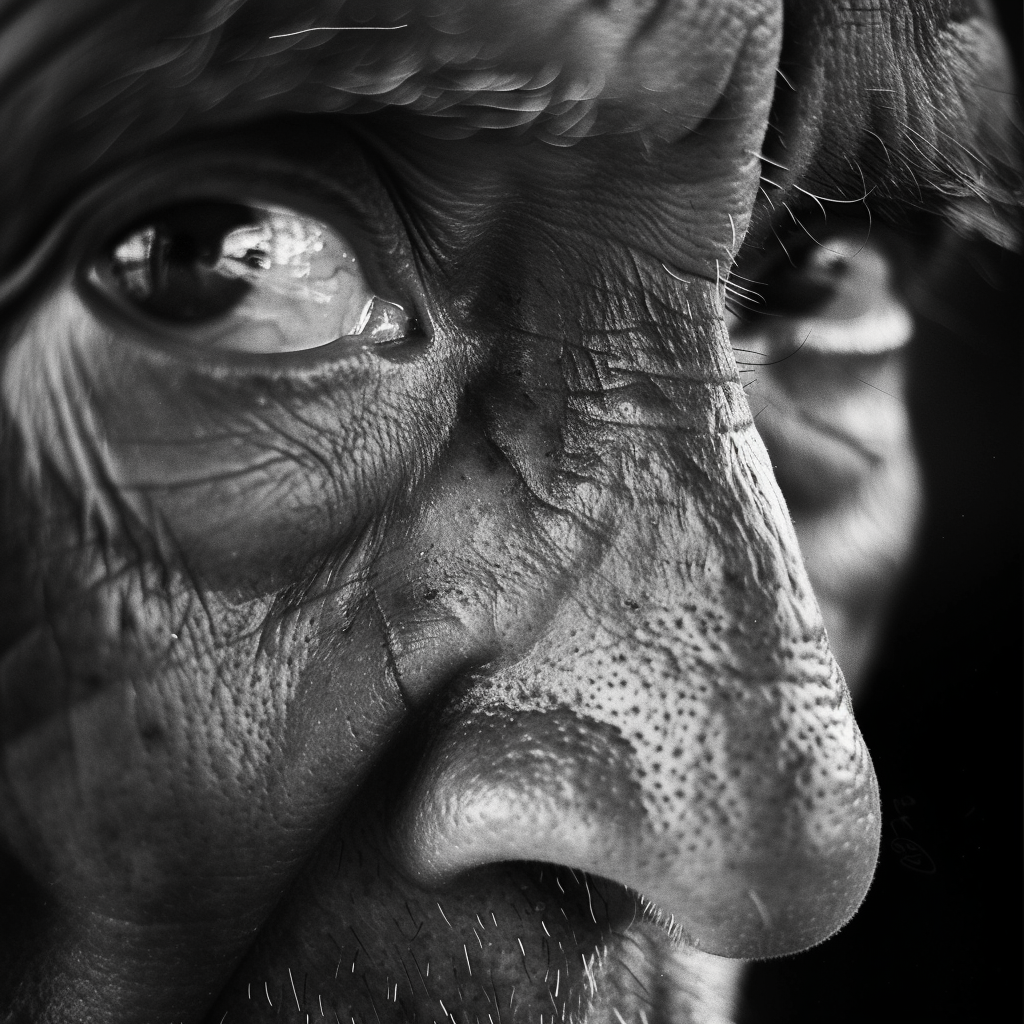
Um close-up de um homem mais velho | Fonte: Midjourney
“Não”, respondi, pegando as fotos que tirei quando Lily se mudou.
“Era exatamente assim que o lugar era quando ela se mudou. Se alguma coisa, está mais arrumado agora. Não falta nada, Jack.”
Jack tentou recuperar a compostura, mas os três casais que vieram para a visita naquela tarde viram a casa em seu estado bruto e desagradável. Todos eles foram embora sem fazer um requerimento.

Uma jovem sorridente | Fonte: Midjourney
Enquanto isso, depois de alguns meses, Lily encontrou um novo lugar com um senhorio que apreciava seu polegar verde, não apenas o potencial de lucro. Conforme minha filha se acomodava em sua nova casa, não pude deixar de me sentir orgulhosa.
Lily e eu estávamos sentados em sua nova varanda, olhando para o quintal espaçoso que logo se tornaria seu próximo projeto de jardinagem.
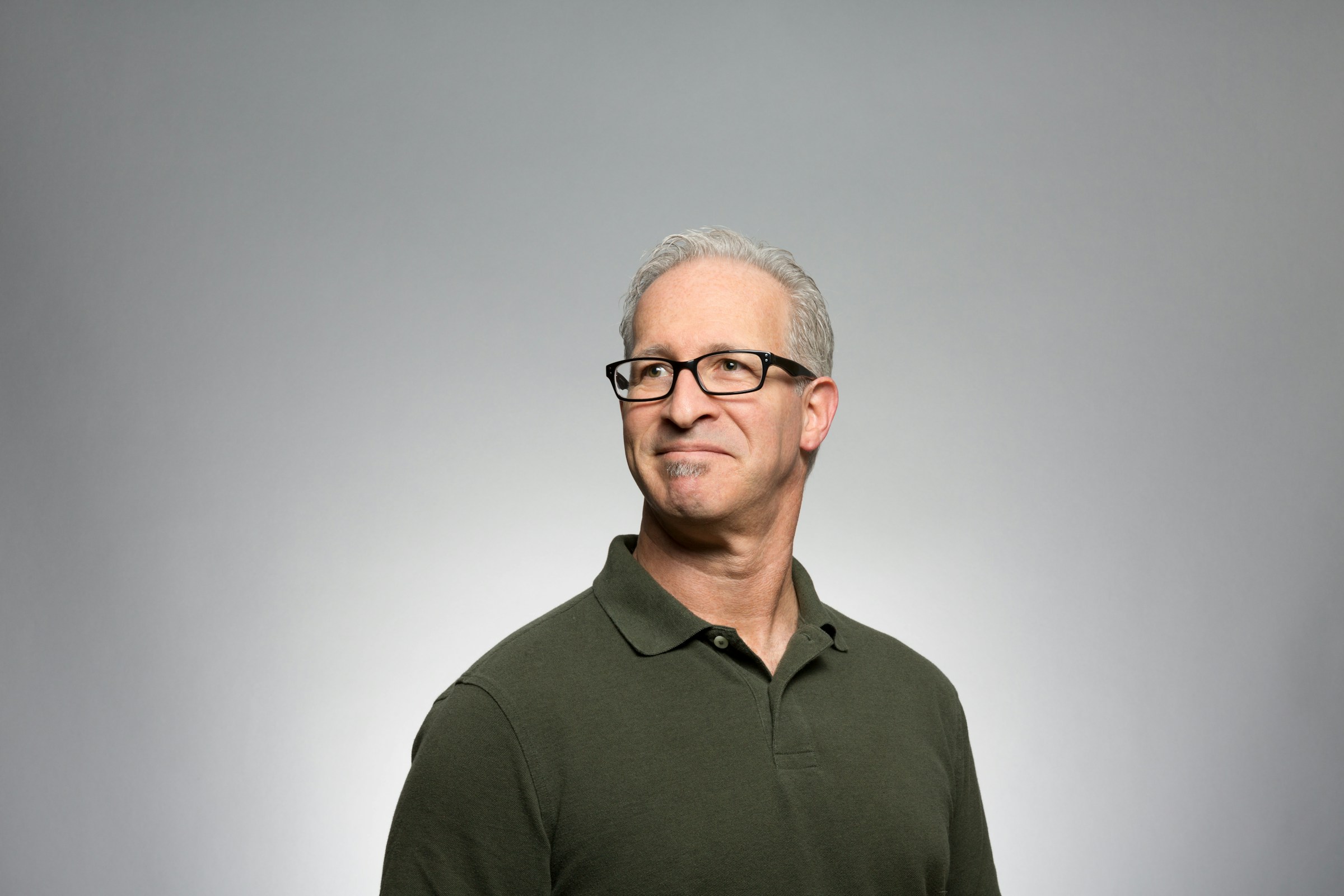
Um homem mais velho sorridente | Fonte: Unsplash
“Pai, não tenho palavras para agradecer”, ela disse, com os olhos brilhando de alívio e excitação. “Eu estava tão assustada, mas você sabia exatamente o que fazer.”
Sorri, apertando a mão dela enquanto balançávamos no balanço da varanda. “Você fez a parte difícil, garota. Você o enfrentou. E agora, você tem um novo começo.”

Um balanço de varanda | Fonte: Unsplash
O que você teria feito?



Leave a Reply